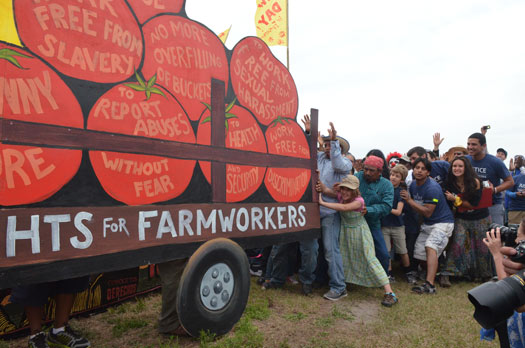Publix defender gets taken to school on workings of Fair Food Program in web-based dialogue
Above, a CIW member portrays Publix resisting progress for farmworkers’ human rights under the Fair Food Program during last spring’s March for Rights, Respect, and Fair Food.
It began last week with a letter to the editor — in Publix’s hometown paper, the Lakeland Ledger — by a Mr. William Norrell of Winter Haven, Florida. His letter begins, as many do, expressing solidarity with farmworkers seeking fairer wages and working conditions. But then it takes a turn, also not unfamiliar, seeking to exonerate Publix from any responsibility for the poverty of farmworkers in its suppliers’ operations. Here’s his letter in its entirety:
I empathize with the Coalition of Immokalee Workers that they should get a decent wage for their labor, but they are targeting the wrong entity.
Publix doesn’t grow produce or pay laborers to harvest it. It generally buy through a packing facility, produce broker or direct from a farmer. What it pays per carton is what the market calls supply and demand. Small supply, higher the price. Heavy supply, the smaller the price.
Generally speaking, packing facilities contract with farmers who grow crops for them to pack, or these facilities own the farms that grow their crops for them. When it is time for crops to be harvested, the packing facilities or farmers contract through a labor provider to provide laborers to harvest their crops. In turn, they are the ones that pay the laborers to harvest.
If Publix did agree to pay the extra penny a pound, there is no guarantee that the laborers would share the benefits of it.
So it would seem that the Coalition of Immokalee Workers should go after the packing facilities or farmers that pack their own. The packing facilities or farmers set the price that Publix and other companies pay that is based on the market price on any given day.
Publix pays its employees decent wages and benefits, but is not responsible for what goes on outside its corporate structure.
So you would think that the Coalition of Immokalee Workers would go after the immediate benefactors of their labor, packing facilities and or farmers who should be paying them the wages they justly deserve.
WILLIAM NORRELL
Winter Haven
Well, the Fair Food Nation is many things, but bashful is not one of them. It wasn’t long before Mr. Norrell’s letter received a response from a Fair Food activist from Denver, Colorado, Robert McGoey, and the difference between the unsubstantiated opinions of Mr. Norrell’s letter and the informed, researched, reasoned response by Mr. McGoey couldn’t be more stark. Here below is Mr. McGoey’s response, which is long, but well worth the read. You be the judge as to which argument is more compelling:
I’m glad Mr. Norrell empathizes with the Coalition of Immokalee Workers’ long-time efforts to improve the wages and working conditions of farmworkers in Florida’s tomato industry. It’s something that everyone should be concerned about.
I guarantee him, however, that the CIW is not misguided in their campaign to convince Publix (and other large food retailers who are major purchasers of Florida tomatoes) to contribute to ensuring fair wages and human rights protections for farmworkers. Even though they are on the lowest rung of the agricultural industry, CIW members have an excellent understanding of the industry in which they work – an understanding that has developed and sharpened over the years, and has been shown to be correct not only by anecdotal and empircal evidence but also by the fact that their strategy is working and wages and working conditions are improving.
For many years the CIW did target growers and labor contractors directly and saw only minimal improvements. They eventually realized that the real power players in the industry were the major purchasers of tomatoes. A very basic explanation of this understanding goes like this: due to the consolidated purchasing power of supermarket chains and fast food companies, such companies are able to demand enormous quantities at extremely low prices. These high volume/low cost purchasing practices place a downward pressure on the operating margins of growers which in turn places a downward pressure on the wages and working conditions of workers. Growers are caught in a cost/price squeeze – facing on one side increasing cost of productions (fuel, equipment, fertalizer, etc.) and on the other side a decreasing market price. The only place where they can hold down costs is labor.
If you’d like a detailed analysis of consolidation within the retail food industry and Florida tomato industry and the impact that has on the market spread (the difference between the farm-gate price and the retail price) and ultimately farmworkers rights you can read Oxfam’s report “Like Machines in the Field” (google it). If you want something a little more recent and more enjoyable to read, I recommend John Bowe’s book Nobodies or Barry Estabrook’s book Tomatoland.
Or to hear a tomato packer speak to the issue from an industry perspective, there is this 2005 article about Burger King’s purchasing practices: http://www.sfalliance.org/media/Packer2005.pdf.
I also highly recommend reading the CIW’s website. If you go through the archives you can find many reflections in their own words which articulate very well why they are targeting companies like Publix. You might start with this point-by-point rebuttal to Publix official explanation for not working with the CIW: https://ciw-online.org/2011/04/03/put_it_in_the_price/.
So it is the large purchasers who ultimately benefit from farmworkers’ low wages and the large purchasers’ demand for the lowest possible price without regard for the what happens “behind the scenes” that fuels the low wages and abusive working conditions which farmworkers experience. In this sense, Publix does have a responsibility for what happens outside its corporate structure. And just as Publix purchasing practices can contribute to low wages and labor abuses, Publix purchasing practices can contribute to fair wages and fair labor practices – Publix can reward growers who commit to fair practices and can avoid growers to violate such practices. This is precisely what the CIW is demanding and there is a structure in places for ensuring that such policies are implemented – the Fair Food Program. Through the Fair Food Program, growers agree to abide by a code of conduct, the CIW educates workers about their rights, farmworkers report abuses through an anonymous complaint system, a 3rd party (the Fair Food Standards Councils) investigates complaints and audits everyone portion of the system for compliance, and the participating purchasers contribute a penny more per pound and provide market consequences for growers who fail to comply.
It is a system that reinforces each of its different parts like the legs of a table. And it is a system that was only made possible because the CIW decided to target the retail companies instead of the growers. But I suppose that’s a whole other story. That fact that the Fair Food Program is now operating on the vast majority of Florida tomato farms is perhaps the best evidence that the CIW is not misguided in targeting retailers like Publix. What is needed now to strengthen the Program, continue to improve wages, and isolate those growers who refuse to comply is for more retailers to join – and that means Publix!
To conclude, I’d like to correct Mr. Norrell’s statement that “If Publix did agree to pay the extra penny a pound, there is no guarantee that the laborers would share the benefits of it.” Through Fair Food Program, there is a guarantee. The Fair Food Standards Council monitors the participating purchasers’ FL tomato purchases and payments of the penny/lb as well as monitors the growers to make sure they are passing the pennies along to workers. The extra Fair Food bonus appears as a separate line item on workers’ paychecks. To date, there has been over $10 million (I believe) which has gone to the farmworker community as a result of this program. The CIW is not naively asking Publix to pay a penny more and crossing their fingers that it helps; they are asking Publix to participate in a robust program to ensure transparency, monitory and enforcement of human rights in its supply chain. I encourage everyone to trust farmworkers’ own strategy as they seek to defend their own rights.
 Pretty thorough, huh? About the only thing from Mr. Norrell’s letter that went unaddressed was the line — so confidently asserted that most readers would assume it’s the truth — about farm labor contractors, or crewleaders, being “the ones that pay the laborers to harvest.” While that might have been the case ten years ago, the norm today, thanks to the Fair Food Program, is that farmworkers are the employees of the farms where they pick and are paid by the grower, not the contractor.
Pretty thorough, huh? About the only thing from Mr. Norrell’s letter that went unaddressed was the line — so confidently asserted that most readers would assume it’s the truth — about farm labor contractors, or crewleaders, being “the ones that pay the laborers to harvest.” While that might have been the case ten years ago, the norm today, thanks to the Fair Food Program, is that farmworkers are the employees of the farms where they pick and are paid by the grower, not the contractor.
The whole exchange pretty much sums up the debate between those who support Fair Food and those who would defend Publix’s right to do business with its suppliers no questions asked, despite the indisputable reality of farm labor abuse and exploitation that characterized Florida’s tomato fields for so long before the advent of the Fair Food Program. Our congratulations go out to Mr. McGoey for having taken the time and effort to put together such a thorough and thoughtful letter, and we can only hope that Mr. Morrell’s professed empathy for the plight of Florida’s farmworkers is genuine, because if so, then after seeing this response, he has little choice but to add his voice to the growing chorus calling out for Fair Food around the nation!


